
Entorno Geografico
Scope & Guideline
Fostering Collaboration in Geography and Environmental Studies
Introduction
Aims and Scopes
- Interdisciplinary Approaches:
The journal emphasizes interdisciplinary research that merges geography with fields like sociology, urban planning, environmental science, and cultural studies, providing a comprehensive understanding of spatial phenomena. - Urban and Regional Studies:
A consistent focus on urban and regional studies allows for analysis of local governance, urbanization processes, and community dynamics, particularly in Latin American contexts. - Environmental Analysis and Management:
Research often includes environmental assessments, climate change impacts, and landscape management strategies, highlighting the journal's commitment to sustainability and ecological considerations. - Cultural and Social Geography:
The journal explores cultural dimensions of geography, including indigenous perspectives and community narratives, enriching the discourse on identity and social structures. - Geospatial Technologies and Methodologies:
A significant emphasis is placed on the application of geospatial technologies and innovative methodologies for data collection and analysis, enhancing the precision and relevance of geographical research.
Trending and Emerging
- Climate Change and Resilience Studies:
There is a notable increase in research addressing climate change impacts, adaptation strategies, and resilience planning, emphasizing the urgency of these issues in geographical studies. - Gender and Geography:
Emerging themes around gender perspectives in geography, particularly concerning urban planning and social dynamics, reflect a growing recognition of the importance of gender in spatial analysis. - Indigenous Knowledge and Practices:
A rising interest in incorporating indigenous knowledge systems into geographic research signifies a commitment to understanding and valuing local perspectives in environmental and cultural contexts. - Smart Cities and Technology Integration:
The exploration of smart territories and the integration of technology in urban management has gained traction, showcasing the journal's alignment with contemporary urban studies and technological advancements. - Health Geography:
An increasing focus on health-related geographical studies, particularly in relation to environmental factors and urban health challenges, underscores the relevance of geography in public health discussions.
Declining or Waning
- Traditional Geographic Education:
Research focusing on conventional methods of geographic education has decreased, possibly due to a shift towards more innovative and integrated pedagogical approaches that emphasize critical thinking and real-world applications. - Static Environmental Assessments:
There seems to be a waning interest in static environmental assessments that do not incorporate dynamic changes or community involvement, indicating a move towards more participatory and adaptive management strategies. - Historical Geography:
While historical geography remains important, its representation in recent publications has diminished, suggesting a potential shift towards contemporary issues and immediate geographical challenges. - Basic Geographic Mapping Techniques:
Basic mapping techniques that do not leverage advanced geospatial technologies have seen less focus, as researchers increasingly prefer more sophisticated methods that provide deeper insights into geographical phenomena.
Similar Journals

Revista Acta Geografica
Mapping the Future of Geographic ScienceRevista Acta Geografica is a prestigious academic journal published by the Universidade Federal de Roraima, specializing in the dynamic field of geography. With the ISSN 1980-5772 and E-ISSN 2177-4307, this journal provides a platform for interdisciplinary research that addresses geographical phenomena, spatial analysis, and environmental concerns primarily relevant to the Brazilian context but also extending to global studies. As an open-access journal, it aims to foster knowledge distribution among researchers, professionals, and students without financial barriers, promoting wider dissemination of scientific outcomes. The journal continues to play a critical role in advancing geographical scholarship, emphasizing both theoretical frameworks and applied methodologies. With a commitment to quality and innovation, Revista Acta Geografica is an essential resource for anyone invested in geographical research and practice.
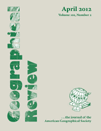
GEOGRAPHICAL REVIEW
Charting New Territories in Earth-Surface StudiesGEOGRAPHICAL REVIEW, published by Taylor & Francis Inc, is a premier academic journal recognized for its influential contributions to the fields of geography and earth-surface processes. With an ISSN of 0016-7428 and an E-ISSN of 1931-0846, this journal has established itself as a vital resource for researchers, professionals, and students alike. The journal maintains a strong reputation with a Q1 ranking in both Earth-Surface Processes and Geography, Planning and Development, reflecting its scholarly impact and relevance in the academic community. Additionally, it holds a notable position in Scopus rankings, placing #181 out of 821 in Social Sciences and #45 out of 179 in Earth and Planetary Sciences. Although it is not open access, the GEOGRAPHICAL REVIEW remains essential for those seeking to expand their understanding of spatial analysis and environmental processes from its historical inception in 1969 to its ongoing publications through 2024. Explore rigorous research articles, critical reviews, and innovative studies that shape the discourse in geography and earth sciences today.
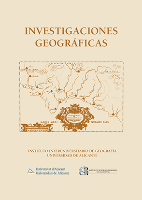
Investigaciones Geograficas-Spain
Exploring the intersections of geography, planning, and development.Investigaciones Geográficas-Spain is an esteemed academic journal published by the Universidad de Alicante, dedicated to advancing the fields of geography, planning, and development as well as earth and planetary sciences. With its commitment to open access since 1983, the journal ensures that research is readily available to a global audience, facilitating knowledge dissemination and collaborative discourse. As reflected in its 2023 Scopus rankings, it holds a commendable position within the Q3 category in both Earth and Planetary Sciences and Geography, Planning and Development, making it a noteworthy resource for scholars and practitioners in these disciplines. The journal's scope encompasses diverse geographical research, aiming to address pressing environmental and societal challenges through empirical studies and theoretical advancements. By contributing to the knowledge reservoir from Spain and beyond, Investigaciones Geográficas-Spain serves as a vital platform for researchers, professionals, and students seeking to enrich their understanding of geographical phenomena.
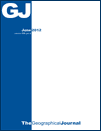
GEOGRAPHICAL JOURNAL
Fostering critical research for informed policy and practice.Geographical Journal, published by Wiley, is a leading scholarly resource dedicated to advancing the field of geography and earth-surface processes. With an established history dating back to 1973, this prestigious journal thrives on disseminating high-quality research, featuring a robust archive that encompasses critical insights from various geographical and environmental studies. As evidenced by its impressive Q1 rankings in both Earth-Surface Processes and Geography, Planning and Development, the journal stands out in its commitment to impact and relevance in the academic community. Although not Open Access, the journal provides researchers, professionals, and students with invaluable peer-reviewed articles essential for understanding complex geographical phenomena. Whether you are focused on socio-environmental interactions or earth sustainability, Geographical Journal serves as a cornerstone for innovative research, fostering knowledge that shapes policy and practice.
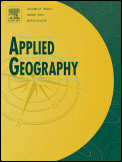
APPLIED GEOGRAPHY
Navigating the complexities of tourism and environmental science.APPLIED GEOGRAPHY, published by Elsevier Science Ltd, stands as a premier journal within the fields of environmental science, geography, planning and development, as well as tourism, leisure, and hospitality management. With an impressive 2023 impact factor that reflects its high citation rates, this journal is ranked Q1 in several categories, underscoring its significance and influence in interdisciplinary research. Covering a broad range of topics from innovative environmental practices to spatial analysis and socio-economic factors affecting tourism, APPLIED GEOGRAPHY promotes insightful discussions and practical applications that are vital for advancing knowledge and practice in these fields. Researchers, professionals, and students will find the journal's rigorous peer-reviewed articles invaluable for staying informed about the latest trends and findings impacting the geospatial landscape. As an essential resource, APPLIED GEOGRAPHY aims to foster interdisciplinary collaborations and inspire scholarly dialogue, making it a cornerstone for those engaged in the study and application of geography across various sectors.

Geografares
Fostering Interdisciplinary Insights in GeographyGeografares is a distinguished academic journal dedicated to the field of geography, published by the Universidade Federal do Espírito Santo since 2009. With an ISSN of 2175-3709, this open-access journal aims to provide a platform for researchers, professionals, and students to publish and disseminate high-quality studies that contribute to the understanding of geographical processes and issues in a global context. Geografares plays a pivotal role in fostering interdisciplinary dialogue at the intersection of geography, sociology, and environmental studies, emphasizing the importance of geographic research in addressing contemporary societal challenges. Accessible to a wide audience, this journal encourages submissions that bring innovative perspectives and methodologies, thus enhancing the academic landscape of geography. As an open-access journal, Geografares ensures that knowledge is freely available, promoting widespread engagement and collaboration within the research community.
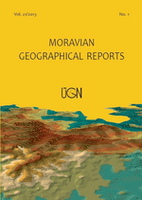
Moravian Geographical Reports
Advancing Earth Sciences through Open Access KnowledgeWelcome to the Moravian Geographical Reports, an esteemed Open Access journal published by SCIENDO, dedicated to advancing the fields of Earth and Planetary Sciences as well as Geography, Planning and Development. Established in 1993, this journal has steadily built a reputation for disseminating high-quality research, evidenced by its 2023 Q2 ranking in both relevant categories and an impressive Scopus percentile ranking of 72. With a dedicated editorial board and an expanding global readership, the Moravian Geographical Reports serves as a vital platform for researchers, professionals, and students alike, fostering dialogue and collaboration across various dimensions of geographical and environmental studies. Since its shift to Open Access in 2013, it has significantly enhanced the accessibility and reach of its published works, making crucial research findings available to a broader audience. The journal continues to thrive as a significant contributor to the geographical and earth sciences discourse during its converged years from 1993 to 2024.
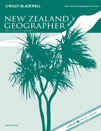
New Zealand Geographer
Charting New Territories in Geographic ScholarshipNew Zealand Geographer, published by WILEY, is a distinguished academic journal that has made significant contributions to the fields of geography, planning, and earth sciences since its inception in 1945. With a dedication to advancing knowledge through rigorous research and critical analysis, the journal encompasses a broad spectrum of topics relevant to both regional and global geographies. This journal is currently indexed in Scopus, achieving commendable rankings in multiple categories, including a Q3 status in both Earth and Planetary Sciences and Geography, Planning and Development for 2023, highlighting its relevance and standing within the academic community. Although it does not currently offer open access, its commitment to providing insightful and impactful content ensures that it remains a vital resource for researchers, professionals, and students alike seeking to deepen their understanding of geographical phenomena. The journal's ongoing publication until 2024 continues to foster scholarly discourse, making it an essential platform for innovative research in geographic studies.

Revista Geografica Venezolana
Navigating the Complexities of Geography and PlanningRevista Geografica Venezolana is a prominent academic journal published by the Instituto de Geografía y Conservación de Recursos Naturales, Universidad de los Andes, Venezuela. With ISSN 1012-1617 and E-ISSN 2244-8853, it has been a vital platform for scholarly discourse since its inception in 1981, addressing essential topics within the fields of Earth-Surface Processes and Geography, Planning, and Development. Despite its current categorization in Q4 quartiles and lower rankings in Scopus, the journal serves as an important resource for researchers and practitioners, offering insights that contribute to the understanding of geographical and environmental challenges in Latin America and beyond. The journal aspires to foster interdisciplinary dialogue and promote research that tackles pressing societal issues through geographical perspectives. Readers are encouraged to explore its rich content and engage with contemporary research methodologies and findings in the geographical sciences, making it a critical reference for students, researchers, and professionals in the field.

CyberGeo-European Journal of Geography
Navigating the Landscape of Geographical ResearchCyberGeo-European Journal of Geography, published by CYBERGEO, is a leading open-access journal that has been at the forefront of geographical research since its inception in 1996. With a dedicated focus on the multifaceted dimensions of geography, the journal aims to disseminate innovative and critical insights into geographical phenomena in Europe and beyond. The journal has established itself in the academic community, currently holding the Q3 quartile ranking in the Social Sciences (miscellaneous) category for 2023 and recognized within Scopus as #428 out of 604, placing it in the 29th percentile. CyberGeo publishes original research articles, thematic issues, and reviews that contribute to the advancement of geographical knowledge, making it an essential resource for researchers, professionals, and students alike. Situated in Paris, France, the journal embraces a truly international perspective and invites contributions that stimulate scholarly debate and further the understanding of spatial dynamics. By providing open access to its content, CyberGeo ensures that its research is accessible to a global audience, promoting knowledge sharing and collaborative exploration in the field of geography.